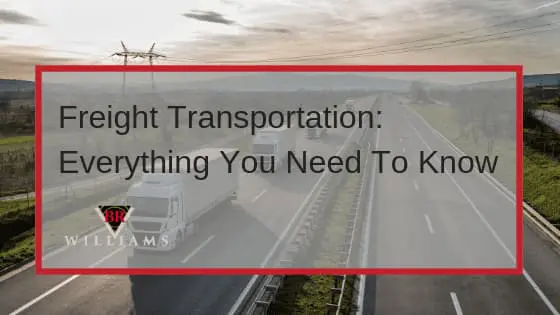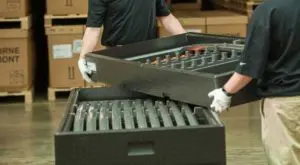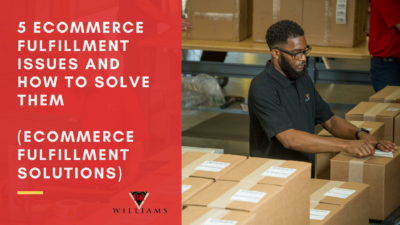
A lot of companies – from small businesses to sprawling corporations – are continually searching for freight transportation services that can keep up with growth. The problem? Logistics and supply chain management can be confusing, and what you don’t know can cost you. This guide to freight transportation fills you in on everything you need to know about freight services so that you can make the best possible decisions for your business.
- 4 Basics (logistics, trucking, distribution, intermodal)
- Minimizing Freight Damage
- Difference Between FTL and LTL Shipping
- Efficiency in the Supply Chain
- Do You Need a Freight Services to Grow Your Business?
4 Basics of Freight Transportation & Logistics
Domestic and international shipping can be complicated, even for experienced business owners. There are dozens of variables at play – and that means hiring the right freight transportation service is essential. You need to work with a third-party logistics provider that handles:
Logistics
Third-party logistics companies, commonly called 3PLs, are companies designed to handle a business’s distribution and fulfillment services. These firms allow businesses to focus on more important things – like growth and customer service – rather than filling orders, vetting for-hire trucking companies, or researching transpiration data which typically takes extensive resources. A general rule of thumb: If you’re fulfilling dozens of orders per day and you’re running out of space to store your inventory, you may need to consider working with a 3PL.
Trucking & Transportation
 A good 3PL can handle freight shipments between your factory and your warehouse or your warehouse and your buyers – or both. Pricing for these types of services usually depends on:
A good 3PL can handle freight shipments between your factory and your warehouse or your warehouse and your buyers – or both. Pricing for these types of services usually depends on:
- The origin location
- The destination location
- Shipping method required
- Delivery time required (expedited freight usually carries an additional cost)
Global freight is similar, and in many cases, your 3PL will handle export taxes and duties on your behalf.
Distribution & Warehousing
 As your business grows, you’ll most likely need a 3PL that handles warehousing and distribution. This type of 3PL will take care of storage, shipping service, and returns. The 3PL you choose should provide end-to-end tracking that shows you where your products are every step of the way – even tracking down to units of measure if necessary. It should also provide customers with delivery data based on what’s recorded in a complete warehouse management system, or WMS. Here’s what to look for in a distribution and warehousing service:
As your business grows, you’ll most likely need a 3PL that handles warehousing and distribution. This type of 3PL will take care of storage, shipping service, and returns. The 3PL you choose should provide end-to-end tracking that shows you where your products are every step of the way – even tracking down to units of measure if necessary. It should also provide customers with delivery data based on what’s recorded in a complete warehouse management system, or WMS. Here’s what to look for in a distribution and warehousing service:
- Compliance reporting and labeling
- Online inventory and order visibility
- Lot and serial number tracking
- Sequencing
- Pick and pack services
- Order fulfillment
- Light subassembly
Intermodal Trucking & Drayage
Intermodal shipping is a must for many companies. If your intermodal shipment arrives in one location by ocean freight, waterways transportation, air freight or train, it still needs to go to a warehouse or distribution center by truck. In cases like these, you need a 3PL that provides freight transportation services such as:
- Container drayage
- Cross-docking
- LCL consolidation
- Kitting and packaging
- Container stripping and stuffing
- Breakbulk
Minimizing Freight Damage
Suppliers, retailers and other shippers spend a lot on freight damage, which is another reason it’s so important to work with a 3PL that has a solid reputation for excellence in freight services. Damaged freight costs more than money, though – it costs you relationships with your customers. While it’s not completely preventable, there are things that good freight transportation companies can do to minimize freight damage, including:
- Top-quality packaging. Packaging is an area where you get what you pay for – spending the right amount on protecting your items can prevent bigger loss costs in the future.
- Proper palleting. Pallets have to be structurally sound, and the weight has to be distributed evenly on each pallet – and then, everything has to be secured properly.
- Accurate labeling. Labels have to be clear, informative and easily visible, and each shipment has to have a complete bill of lading that outlines special instructions such as “non-stackable.”
Full Truckload Shipping vs Less-Than-Truckload Shipping
Difference Between FTL & LTL
When you choose a freight service, you need to know the difference between full truckload (FTL) and less-than-truckload (LTL) shipping. Both have appropriate uses, but they’re very different. Let’s compare them:
 Full Truckload Shipping (FTL)
Full Truckload Shipping (FTL)
Full truckload shipping, or FTL, is a good method if you have a large shipment that will fill an entire trailer. Typically, if the freight weighs more than 15,000 pounds or the shipment includes more than ten pallets, FTL is the way to go. However, it costs more than less-than-truckload shipping does. The benefits of FTL might outweigh that cost, however – FTL means that the truck goes directly from Point A to Point B without any stops, and there’s no chance of goods being offloaded at the wrong location.
Less-Than-Truckload Shipping (LTL)
Less-than-truckload shipping, or LTL, is ideal for use when you don’t have a shipment large enough to fill an entire trailer. If your freight weighs less than 15,000 pounds, or your shipment is under ten pallets, LTL may be the right choice. In LTL, several small shipments – including those from other manufacturers – share space in a truck.
Sometimes LTL increases the chances of damage during transport; that’s because cargo is loaded and unloaded around your items, and sometimes your items are taken off and put back on the truck multiple times. Because LTL trucks stop at multiple destinations, transport times can be a little longer. However, it’s often cheaper than FTL shipping, because you only pay for the space your freight takes in the truck.
Efficiency in the Supply Chain
It’s essential that you work with a freight service that keeps your costs as affordable as possible – and one of the biggest drains on a company’s profits is inefficiency in the supply chain. Every process that operates below the standard costs you, so you need a 3PL that streamlines everything from warehouse layout to freight tracking.
Do You Need a Freight Service to Grow Your Business?

Since 1958, we’ve been helping businesses grow through logistics and freight transportation services.
Supply chain issues are some of the biggest constraints businesses face, but working with the right 3PL can alleviate them – and enable you to grow your company.
If you need a freight service, we’ll be happy to answer your questions, explain our processes, and show you how we can save you money as your business branches out. Call us at (256) 831-5580 or request a free quote online to discover how we can help you.
Find a BR Williams Location:





